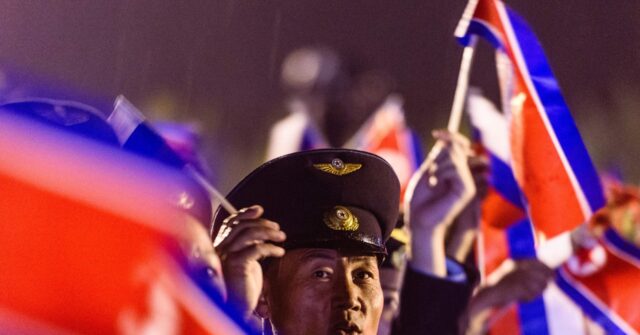South Korean Defense Minister Kim Yong-hyun said at a congressional event on Tuesday that he believed it “highly likely” communist North Korea sent soldiers to fight in the Russian invasion of Ukraine – and similarly probable it has suffered numerous “casualties.”
Kim was speaking at an audit session, the Korea JoongAng Daily reported on Tuesday, and assessing how close the military ties between Moscow and Pyongyang have become.
“We assess that the occurrence of casualties among North Korean officers and soldiers in Ukraine is highly likely, considering various circumstances,” Kim stated.
The possibility of North Korean troops invading Ukraine at all, Kim asserted, was also “highly likely” because “Russia and North Korea have signed a mutual treaty akin to a military alliance.”
North Korea, one of the world’s most repressive states, has invested heavily in the past year in strengthening ties to Russia. Communist dictator Kim Jong-un made a rare trip outside of his own country in September 2023 to eastern Russia, where he held meetings with strongman Vladimir Putin and was showered with gifts, including a fleet of potentially sanctions-violating kamikaze drones. Putin returned the favor in June, visiting Pyongyang for the first time since 2000. It was during this visit that Putin and Kim signed the “mutual treaty” the South Korean defense minister highlighted on Tuesday.
The mutual defense agreement, both Pyongyang and Moscow seem to agree, contains some element of commitment on both sides to take military action in the event that one of the two countries is attacked. North Korea previously boasted a similar deal with the defunct Soviet Union, but had yet to achieve a similar agreement with modern Russia prior to this summer.
The military agreement raised international alarm as both countries are already deeply embroiled in military struggles. North Korea has been in a technical state of war against South Korea since 1950, though an armistice agreement in 1953 has halted most belligerent activity across the Demilitarized Zone (DMZ). Russia, in turn, began invading and colonizing neighboring Ukraine in 2014, seizing control of Ukraine’s Crimean peninsula.
In 2022, Putin escalated the violence by announcing a “special operation” to oust Ukrainian President Volodymyr Zelensky, decrying him as a “Nazi” and claiming, despite Zelensky winning a free and fair election in 2019, that the ouster of pro-Russian President Viktor Yanukovych in 2014 invalidated Zelensky’s presidency. Zelensky had not entered politics at the time, working as a professional comedian.
The “special operation” has become a full-scale war that took a dramatic turn in September, when Ukrainian forces launched a counter-invasion and seized Russian territory on its border. That development prompted more speculation that, using the mutual defense agreement, Putin could compel Kim to send North Korean troops into battle against the Ukrainians.
North Korea has enthusiastically supported Russia’s invasion of Ukraine, but stopped short of admitting to any participation in the conflict.
In October, Ukraine’s Kyiv Post reported, citing anonymous “intelligence sources,” that a Ukrainian attack on a Russian position in the embattled Donbas region of Ukraine killed six North Koreans, there fighting on Russia’s behalf, and injured three others.
“According to reports from Russian social media, prior to the missile strike, the Russians were demonstrating to North Korean representatives the training of personnel for assault actions and defense,” the Post reported at the time.
Neither North Korea nor Russia has confirmed any such casualties. Rumors began surfacing in June, shortly after the signing of the mutual defense treaty, that North Korea was planning to send a contingent of engineers to help the Russians. Putin addressed the rumors at the time, stating, “As for the possibility of somehow using each other’s capabilities in this conflict. Well, we are not asking anyone for this, no one has offered it to us, so there is no need.”
While Ukraine has not presented any hard evidence of North Koreans fighting in the Russian invasion, reality contradicts Putin’s claim that Russia has “no need” for help. Nationals from at least two countries, India and Cuba, have been identified on the front lines in support of the invasion of Ukraine, all appearing to have gotten there by answering fraudulent job advertisements.
In India, Prime Minister Narendra Modi faced a national scandal over the summer when the families of several young Indian men denounced that their sons had been duped into accepting what they believed to be private sector jobs in the Middle East. Upon getting on their planes, they were diverted to Ukraine, where they served as cannon fodder. At least four Indian men have died fighting for Russia in Ukraine.
The Cubans on the ground in Ukraine appear to have largely arrived there by similarly deceptive means. The Ukrainian military revealed early this year that it had captured a Cuban national, Frank Dario Jarrosay Manfuga, fighting in the turbulent Donbass region. After Kyiv allowed Manfuga to conduct interviews, the Cuban said that he was a math teacher and musician who, driven by poverty and desperation to escape Cuba, had answered a Facebook job advertisement offering construction work in Eastern Europe. The “construction” work ended up being fighting against Ukrainians.
The Institute for the Study of War (ISW) predicted in September that Russia would increasingly need to turn to its partners, specifically naming North Korea, to prolong the invasion.
“Russia’s deepening military partnership with North Korea is emblematic of the relationship that Russia aims to create with Iran, the PRC [China], and other desired partners,” the ISW observed. “Russia will likely face dwindling weapons and equipment stockpiles and struggle to offset these shortages unless it can circumvent Western sanctions at scale and significantly expand its engagements with foreign partners to obtain sufficient military materiel, component parts, and dual-use items.”
Follow Frances Martel on Facebook and Twitter.
Read the full article here
